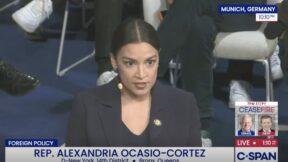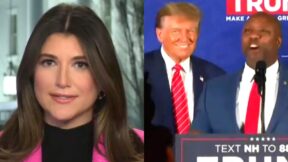Elon Musk and Don Lemon Clash Over Hate Speech on X: ‘Moderation Is a Propaganda Word For Censorship’
Don Lemon’s buzzy interview with Twitter/X owner Elon Musk dropped on Monday, days after Lemon revealed that the conversation cost him his deal with the platform. That didn’t stop Lemon from promoting the interview, which was posted on YouTube instead, and judging by the clips, it’s apparent that the conversation was less than cordial.
At one point, Lemon broached the subject of hate speech on the platform and how it has grown since Musk took over. Musk pushed back, saying that he has seen studies reporting the opposite, that “the research that I’ve seen that says it went down.”
But when Lemon confronted Musk over “anti-Semitic and racist tropes and tweets” that were still live on Twitter/X, posts that Lemon said violated Twitter/X’s own content policy, Musk questioned if they were “illegal”:
Lemon: They’re not illegal, but they’re hateful. And they can, they can lead to violence. As I just read to you, the shooters, you know, in all of these mass shootings, attributed social media to radicalizing.
Musk: So, Don, you love censorship, is what you’re saying?
Lemon: No, I don’t love censorship.
Musk: Then why, why are you asking this?
Lemon: I believe in moderation. But I don’t believe in–
Musk: Censorship is a, is a… Moderation is a propaganda word for censorship.
Lemon: But don’t you think free speech is one thing, right, or not–
Musk: If something’s illegal, we’re going to take it down. If it’s not illegal, then we’re putting our thumb on the scale and we’re being censors.
Lemon: You’re putting your thumb on the scale for moderating hate speech? I mean, you don’t put out child pornography. That’s not–
Musk: It’s illegal.
Lemon: Some people would say that’s considered censorship. I’m just saying, you–
Musk: Know, I literally… Don, I literally said if something is illegal, okay, we will obviously remove it.
Lemon went back to how some mass shooters became radicalized on social media, pointing to a possible direct correlation between the hate speech that appears on social media platforms and acts of mass violence:
Lemon: But if you are doing something that promotes hate and violence and ultimately leads to killing, you don’t feel there’s, you have any responsibility not to do that? When the people who are doing admittedly are saying–
Musk: There’s articles all the time that lead to to violence and killing. Don’t they, shouldn’t they… You’re applying a differential standard to–
Lemon: But that would never, that would never be in mainstream media. These types of images, that type of language, those things would never be… We’ve never, when I was in mainstream media, would never promote things that, would would be anti-Semitic.
Musk explained: “You said “promote.” If content is on the platform, that doesn’t mean we promote it.”
Lemon then flat-out asked Musk how he felt when he saw posts containing hate speech on his platform:
Lemon: How do you feel about that when you see it?
Musk: I obviously disagree with that. I think it’s not good at all. It’s horrible.
Lemon: But you don’t want to get rid of it on the platform or at least moderate it.
Musk: It belittles them. You’re, so what you’re suggesting is censorship that goes beyond the law.
At this point, Lemon got visibly exasperated with Musk’s hedging on the language, and he directly pointed — again — to Twitter/X’s own content policy:
Lemon: I understand that, but these are your own rules on your own platform. These go against the rules on your platform. That’s why I’m asking you, if you had, if you said, “Listen, we allow everything,” but that’s not what your content rules say. And that’s why I’m asking you, why are they still there? Your own content policy. That’s why I’m asking you that. Not because–
Musk: Which part about content policy says that we should delete these things?
Lemon: Your content policy talks about hate speech.
Musk: Yes. We don’t promote hate speech.
Lemon: And so you don’t consider that hate speech.
Musk: I guess you’re not understanding what I’m saying. This, this, this if if there’s you can find like that you can sign up right now and, and do 100 things that are hateful. But if nobody reads it, it doesn’t matter. So you can think of X as being, it’s much like the internet. It’s not some tiny publication with like 20 articles a day. There’s 5.2 million–
Lemon: But everyone has the opportunity to read it, Elon. So I think–
Musk: Everyone has the opportunity to read the internet. Are you suggesting we should shut down the internet?
Lemon: No, but you don’t own the internet. I’m asking you about you and your responsibility and your platform and I… So, I see how you feel now. You don’t agree. We don’t agree on this.
Musk: Yes. You want censorship and I don’t.
Lemon: I don’t want censorship at all.Musk: Yes you do.
Lemon: No, I want responsibility. I think there is, I think there–
Musk: You desperately want censorship.
Lemon: No.
Musk: You want censorship so bad you can taste it.
Lemon: No, that’s not true. It’s not true. I think that there’s right and wrong. And I think everyone says. And I think that when you have a platform that’s as big as yours and as powerful as yours and as influential as yours, and you are a person of consequence to the world, what you do, that there is a certain responsibility that goes along with what you have on your platform and what you put out to the world. And I think that’s important. You don’t see that responsibility.
Watch the video above via Don Lemon on YouTube.
New: The Mediaite One-Sheet "Newsletter of Newsletters"
Your daily summary and analysis of what the many, many media newsletters are saying and reporting. Subscribe now!






Comments
↓ Scroll down for comments ↓